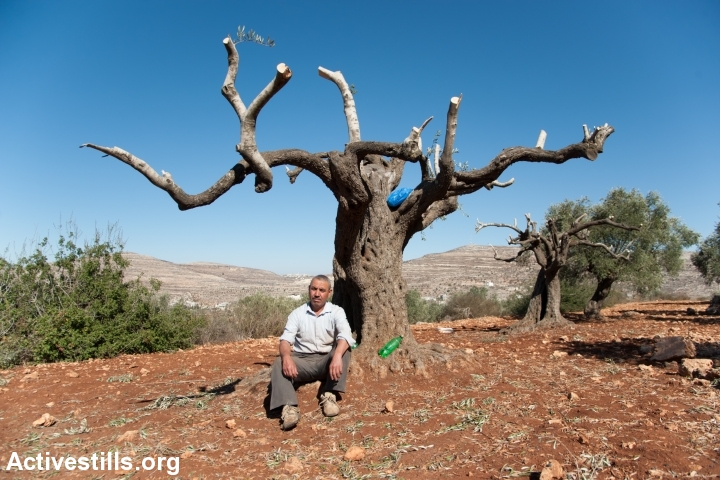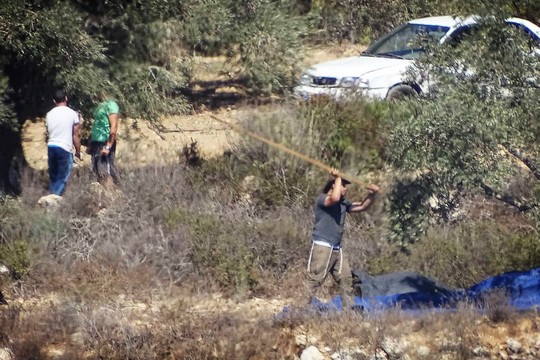Since the beginning of the olive harvest two weeks ago, Israeli human rights organizations have documented 10 cases of settler violence and theft against Palestinians and their property. For now, it seems like the police are doing their job.

The olive harvest season, which began two weeks ago across Israel-Palestine, is one of the most heated seasons in the year for Palestinians in the occupied territories, especially for those living in Area C, under complete Israeli military control.
Nearly every plot of Palestinian land designated for farming in the West Bank is located in this area, yet 60 percent of that very land now belongs to settlement local and regional councils. Israel’s multifarious practices of dispossession, from land expropriations to declaring whole swaths of private property closed military zones, have restricted Palestinian access to their agricultural land. In many places, they are allowed access only during seasons when they plow the land, or during the olive harvest. The success of the harvest has a direct effect on their livelihood. Often times, land that has been abandoned by Palestinians due to settler violence is later taken over by those very same settlers.
Every year at this time, like clockwork, Israeli settlers head out to Palestinian olive groves to sow destruction and violence. Since 2005, Israeli anti-occupation NGO Yesh Din has documented around 280 police cases relating to attacks on olive trees. According to the organization, only six of those cases ended in indictments. Over 93 percent of them were closed due to police failure to find the criminals or to gather the proper evidence to put the suspects on trial. Often times, the army simply “takes care” of conflagrations between settlers and Palestinians by preventing the Palestinians from accessing their agricultural land, a practice that has been roundly criticized by Israel’s High Court of Justice.
Thus, reports over the past few weeks of cases in which Israeli security forces actually caught settlers as they were harassing Palestinian farmers are surprising in just how out of the ordinary they are. Under normal circumstances, a news report on police catching criminals in the act as they attack innocent people would be a case of dog bites man. In the reality of occupation, this is clearly a case of man bites dog.
Last Sunday, for instance, settlers were caught stealing olives from a Palestinian grove adjacent the village of Al-Jinya, not far from the settlement outpost of Zait Ra’anan. Zacharia Sada, who coordinates Israeli NGO Rabbis for Human Rights’ field workers, witnessed the incident and directed the security forces to the area where they caught the suspects.
That same day, Palestinians from the village of Qaryut near the outpost of Habayit Haadom, were also attacked. In this case, too, security forces arrived on the scene apprehended the attackers. On Monday, security forces detained a resident of the settlement Eli — who Palestinians claim has repeatedly harassed them — after he was reportedly caught stealing olives from Qaryut’s olive trees. Later in the week, police detained two Israelis who were harvesting Palestinian olives in the village of Burin.

Violent settlers are seldom caught by law enforcement or the army. Since the beginning of the olive harvest season two weeks ago, Yesh Din has documented 10 cases of violence against Palestinians or their property — including the theft of olives and the destruction of trees — across the West Bank.
On October 16, a resident of the village A-Sawaya, near the settlement of Rechalim, reported that anonymous persons harvested and vandalized 14 of his olive trees. The area in question is next to an IDF security corridor, which forces the owner of the property to coordinate with the army every time he wants to access the land.
According to Yesh Din, Israeli citizens attacked a group of Palestinian harvesters last Saturday in Beit Furik. Palestinians say police arrived on the scene and apprehended one of the attackers. In another case that same day, Israelis tried to prevent Palestinian famers in the village Huwarra from harvesting their trees. They fled when they noticed security forces approaching.
On October 13th, farmers from the village of Jalud complained that anonymous persons had stolen olives from approximately 300 trees on land that can only be accessed by coordinating with the IDF. On that same day, Israelis were seen harvesting olive trees on land belonging to the village of Awarta.
According to Rabbis for Human Rights, the fact that the security forces were able to detain Israelis as they attacked and stole from Palestinians in the West Bank is remarkable. “This behavior teaches us that when there is a will, here is a way for security forces to do their job. Unfortunately, it is especially rare, and many crimes against Palestinian farmers do not receive the proper attention from security forces or law enforcement.”
Yesh Din issued the following response to the events of the past two weeks:
The livelihood of many Palestinians depends on the olive harvest, and thus law enforcement must ensure the ability of Palestinian farmers to reach their land and harvest their trees. As in every year, before the beginning of the olive harvest, we warned the authorities about the growing concern over violence against Palestinians across the West Bank, especially in more dangerous areas. We expect the police and the army to take decisive action against criminals who harm the Palestinian harvesters and their livelihood, to prevent as much dispossession and violence as possible, and to put the criminals on trial. This is the only way to send a message that the Palestinian wellbeing of Palestinians and their property are not being abandoned by the state.”
This post was first published in Hebrew on Local Call. Read it here.

